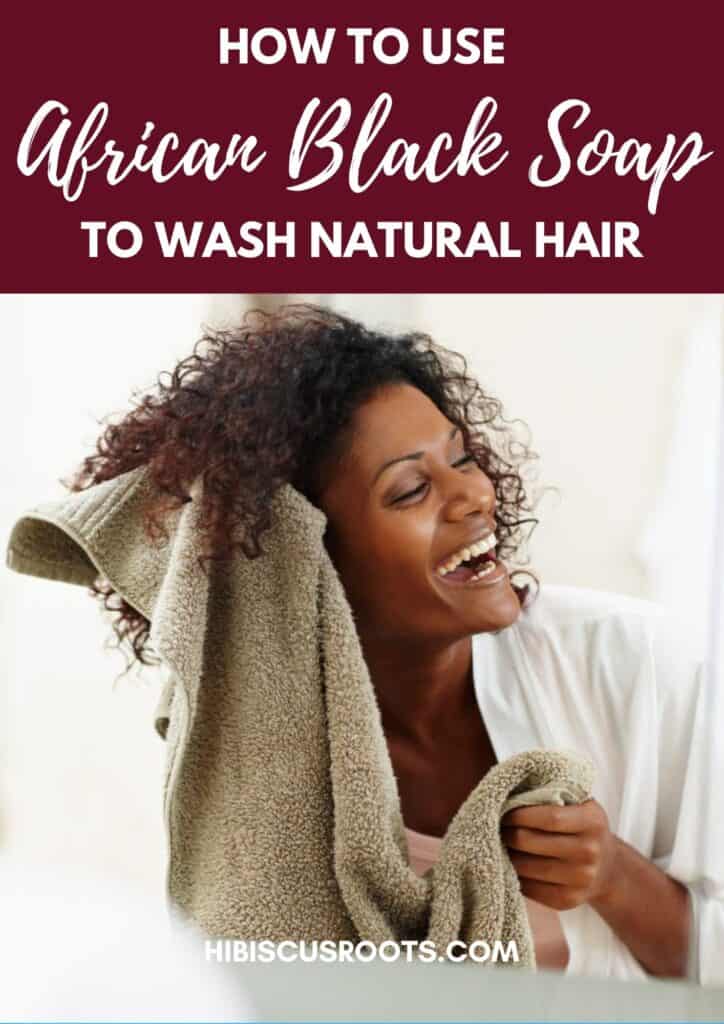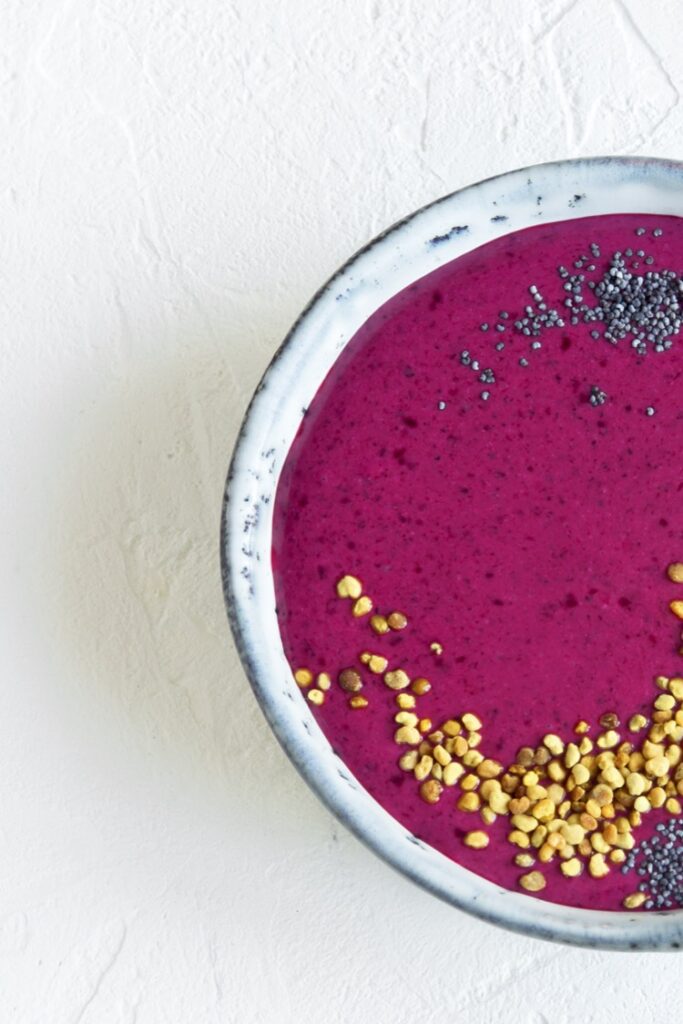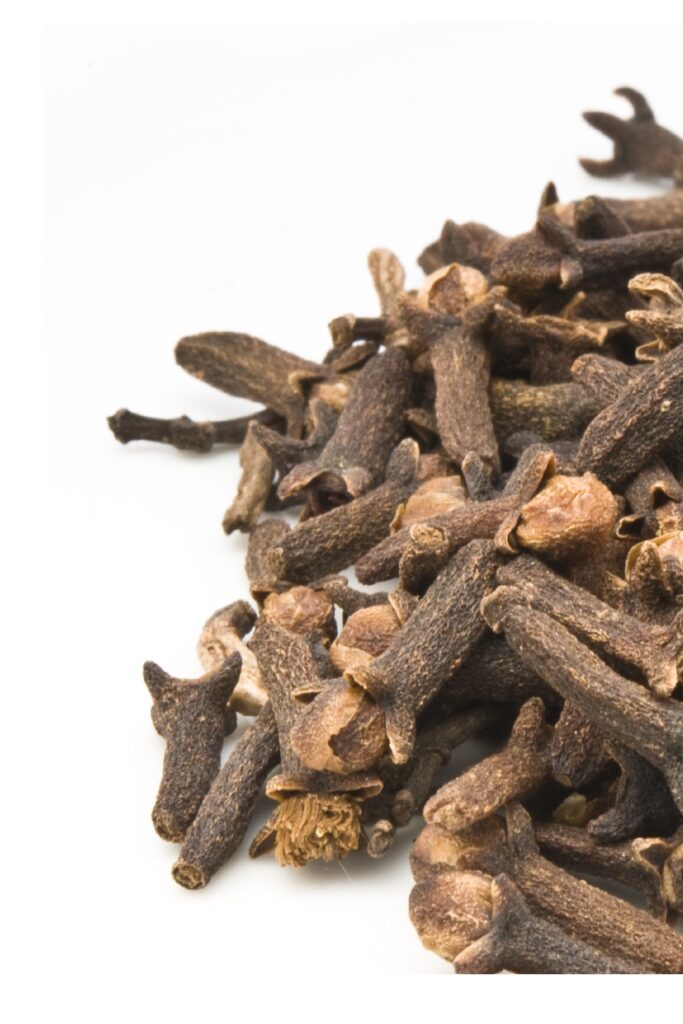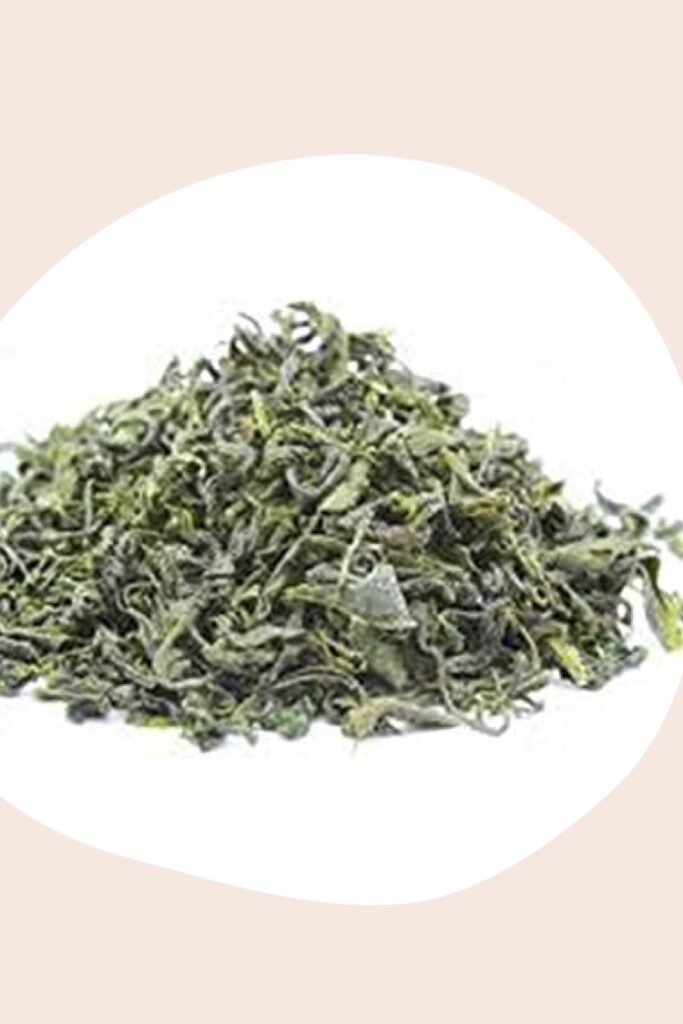Updated: January 15, 2023
In this post, we’re going to be talking about the many benefits of African Black Soap and how you can use this traditional miracle ingredient to wash your type 4 natural hair!
If you have been looking for a more natural, Ayurvedic alternative to shampoo then look no further than African black soap!
This is especially important if you’ve started an Ayurvedic hair journey, you’re using homemade deep conditioners and masks, infusing your own oils, and experimenting with Ayurvedic herbs and powders.
If you’ve already felt like your hair isn’t responding well to these treatments or that “Ayurvedic hair treatments aren’t for you” — this might be why! While you may have been using these treatments and trying to get your hair used to all-natural products. Eventually, wash day comes around and you end up stripping off all that natural goodness with a store-bought shampoo.
If you’re trying to stay away from chemical products, then non-natural shampoos should be the first thing you change. And for anyone who feels that they need chemical or sulfate shampoos because they need their hair to feel “squeaky clean,” hear us out.
If you only use natural products between washdays, you will no longer need harsh chemicals for your hair to feel clean!

What is African Black Soap?
African black soap is a cleansing agent that originates in West Africa. It is also typically made with the ash of local plants including dried plantain skins, palm tree leaves, cocoa posts, and the bark of the shea tree.
Water and various oils and butters like coconut oil, palm oil, and shea butter are then added to the ash. This mixture is then cooked and stirred for a minimum of 24 hours, then left to solidify, cut, and set.
One of the most popular brands of African black soap is Dudu-Osun. Black soap has also recently risen in popularity in the Western beauty industry. This is because of the renowned benefits of African Black soap for oily, acne-prone skin.
What are the Benefits of African Black Soap?
- It is antimicrobial
It is a strong antibacterial product that works to keep the scalp healthy and clean. And as we know, a clean and healthy scalp is the quickest way to fast and healthy hair growth. - It is moisturizing
Because shea butter is one of the primary ingredients of black soap, it is very moisturizing. You can read more about the benefits of shea butter in this post. HOWEVER, though black soap is moisturizing to the scalp, on its own it isn’t moisturizing to the hair strands. - It is anti-inflammatory
African black soap helps calm irritation and inflammation on the scalp caused by eczema, contact dermatitis, psoriasis, and other allergies. - It is antioxidant
African black soap is rich in vitamins like A and E which fight free radicals and other toxins on the scalp.
As you can see, these are all benefits that make African Black soap a great all-natural cleanser, and a great alternative to shampoo.
When buying African black soap, you should ensure that the product you’re buying doesn’t have any artificial additives or dyes. It should be brown in color (not black), soft and rough (not smooth and hard), and easy to break apart. You should also try to make sure that your purchase supports the communities that produce them.
How to Use Black Soap as a Shampoo
The best way to use African Black soap as shampoo is to dissolve it in water. This way you can add more oils, beneficial essential oils, and humectants to it in order to ensure that the product isn’t extremely drying to your hair strands.
You should always apply the shampoo directly to your scalp first, and then run the lather through your hair strands to avoid overly drying out your hair. Additionally, you should follow this up with a deep conditioner of your choice. Pick a treatment that is either moisturizing, strengthening, or both based on the state of your strand at the time.
DIY African Black Soap Shampoo Recipe
Here’s an easy way to make the DIY African Black Soap Shampoo that I like to use. It is inspired by Whitney aka Naptural85 one of our favorite Youtubers, and founder of the all-natural Ayurveda-inspired haircare line, Melanin Haircare.
However, I replaced the vegetable glycerin in the mixture with agave because my hair doesn’t respond well to Glycerin. The measurements in this recipe will make exactly one batch of shampoo for one washday, so you don’t have to worry about preservation.
What You Will Need
- 1 oz African Black Soap
- 2 tbsp Jojoba Oil, Avocado Oil, or any Herb-Infused Carrier Oil
- 1 tsp Sweet Almond Oil
- 1 tsp Neem Oil
- 10 drops Lavender Essential Oil
- 5 drops Tea Tree Essential Oil
- 5 drops Peppermint Essential Oil
- 10 drops Rosemary Essential Oil
- 1 tsp Agave (or Honey)
Instructions
- Cut 1 oz of Black soap into small pieces (or use a grater) and add it to a mason jar.
- Pour water in until the level is about ½ an inch above the pieces of soap.
- Add all the oils, the agave, as well as the essential oils into the mason jar.
- Cover the mason jar, then shake it gently.
- Let the soap dissolve in the water until when you shake the jar, there are no undissolved pieces of Black soap left. (20 – 45 minutes)
- Use a funnel to transfer the Black soap shampoo into an applicator bottle for easy use.
Here’s a video with detailed instructions showing the process of making the shampoo.
How Long does African Black Soap Shampoo Last?
DIY African Black Soap shampoo lasts about 5 days before signs of fungus or bacteria appear. To increase the shelf life of black soap shampoo by a few days, you can store it in the refrigerator. However, if you choose to store your black soap shampoo this way without preservatives, make sure you inspect it to check for signs of fungus or bacteria before you use it (smell and appearance). You can preserve African black soap shampoo by adding a broad-spectrum preservative like Cosgard to your recipe.
Where to Buy Raw Unrefined Black Soap
If you don’t already know or you don’t yet have all the ingredients to make this recipe, you would be happy to know Whitney sells this shampoo (a shelf-stable version) as part of her brand – Melanin Haircare. You can purchase it at ULTA Beauty here!
I’m currently based in France and can’t get my hands on the product myself, so for now this DIY recipe will have to do!
You can also purchase ethically sourced African Black soap online from these brands:
Does Black Soap Grow Hair?
Black soap doesn’t make your hair grow. However, when used as a shampoo, Black soap cleans the scalp, offers antioxidant and antimicrobial benefits. As a result, black soap makes the scalp a clean, conducive environment for healthy hair growth!
Does Black Soap Dry Out Natural Hair?
Raw African Black Soap is said to dry out natural hair because it deeply cleans oils and dirt from the hair and scalp. However, you can reduce the drying effect of black soap if you add oils and other moisturizing ingredients like glycerin or honey to it before using it as shampoo.
Finally, don’t forget to let us know in the comments if you decide to try the recipe. And be sure to record your experience with this homemade shampoo in your Hair Journal. You can grab a free copy here!


